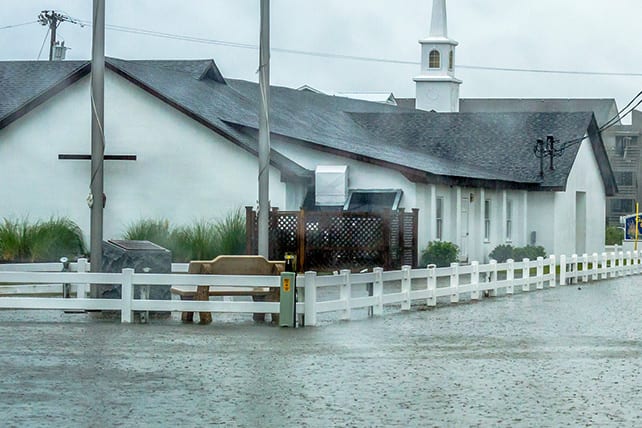A Houston federal judge has denied an emergency request by three Texas churches for access to funds to rebuild sanctuaries damaged during Hurricane Harvey in a case that tests the constitutional boundaries separating church and state, according to an article in The Houston Chronicle.
After three Houston area churches–the Harvest Family Church, the Hi-Way Tabernacle and the Rockport First Assembly of God–filed a lawsuit for FEMA funds, President Trump tweeted the following:
Government relief from the Federal Emergency Management Agency (FEMA) is available under the Stafford Act for certain nonprofit organizations. The question is whether nonprofit religious entities can use federal money to repair and rebuild their church buildings. And opponents and proponents of church/state separation are weighing in.
According to the Texas Lawyer’s law.com:
To receive disaster funds from FEMA under the act, the private nonprofit must operate an eligible facility that provides noncritical, but essential government service. However, the act excludes some services, including facilities used for political, athletic or religious services. But when a private nonprofit facility provides multiple services, it is allowed to receive funding if FEMA determines that less that 50 percent of the facility’s physical space is dedicated to ineligible services.
FEMA says it’s not saying “no”; it’s just saying “wait.” According to a report from the heraldonline.com, “FEMA says it hasn’t denied the churches’ applications but has placed them on hold while a change to its policy is reviewed. Pressure to change the policy has been mounting after this year’s series of devastating hurricanes damaged many churches in Texas, Florida and Puerto Rico.”
In his 9-page ruling, U.S. District Judge Gray Miller said he “based his decision on the current FEMA policy and not on the proposed changes, which are currently “speculative and does not impact the challenge to the current policy.” The review of FEMA’s new policy could take up to 90 days to complete.” (wral.com)
Can churches have it both ways? To be separated from the state for tax reasons but to benefit during natural disasters, some wonder. Ultimately, though, those who support the decision argue on the basis of the constitutionality of the decision.
In a Nov. 30 amicus brief, Americans United for Separation of Church and State, the American Civil Liberties Union, the Anti-Defamation League and other organizations said “The Establishment Clause of the First Amendment prohibits public funding of repairs of church sanctuaries and other buildings that are used principally for religious activities,” the groups said in the brief. “And the First Amendment’s Free Exercise Clause does not supersede that prohibition or otherwise require public funds to be put to the support of religious uses,” according to the article Ban on Disaster Aid for Churches Likely Constitutional.


